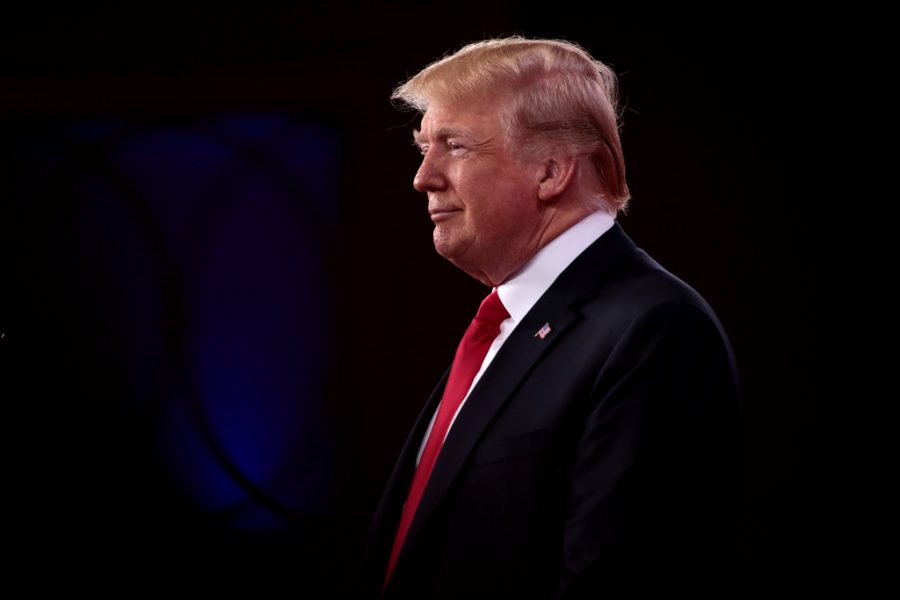Trump’s concerning rule-bending
President Trump has received bipartisan scrutiny for his comments concerning a potential transfer of power.
September 28, 2020
It’s no secret that President Donald Trump thinks of himself as an all-powerful leader; the heart and soul of American democracy, a representation of everything a ‘true patriot’ should be. This public figure Trump has embodied for the past four years has been heavily successful within the GOP. The party has not had a strong and iconic leader perhaps since the days of Reagan, and Trump has proven to be exactly what they needed to retain their once formidable strength in the ever-changing American political climate. However, as Trump becomes more unstable, the GOP frantically loses its footing and grip on American voters.
Trump is no stranger to controversy over his words, whether they be misinterpreted by onlookers or just plain offensive. Yet it seems as though every day Trump’s behavior catches up to him faster and faster, including snide comments about veterans, immigrants or even late Supreme Court justices. His most recent offense getting him heat from the DNC and mainstream media is his stance on the election, particularly one crucial question: what happens if he loses?
Several weeks ago, Trump began placing the first seeds of doubt in his supporter’s minds that this election may not be entirely honest. He began with his attempt to dismantle the USPS, an organization that is critical to Americans, especially this year, when mail-in voting will be more popular than ever. This attempt was a subtle way to prevent votes from coming out of heavily populated areas largely affected by COVID-19 (many states including California, Oregon and Connecticut have shifted to strictly mail-in ballots this election). These actions came under the guise of Trump’s concern about election fraud; he stated that “the fraud and abuse would be an embarrassment to our Country.” The President claimed that mail-in voting makes it much easier to commit voter fraud, therefore swaying election results. Contrary to Trump’s statement, though, a Washington Post review of the 2016 election found that there were only four proven fraudulent votes. Several news outlets including BBC and the New York Times have posited that the amount of voter fraud would not come close to being able to switch election results even in the most extreme cases. Even though Trump’s claims seemed not to carry any weight factually, they have garnered quite a following within the Senate and voters, raising concerns about whether or not the election should be based so heavily on mail-in votes.
These actions were only a precursor to his most recent statement which has not only the Democratic party and his opponents, but his GOP colleagues and allies concerned. At a White House news conference on Wednesday, Sept. 23, Trump was asked by a reporter whether he would commit to a peaceful transfer of power if Democratic opponent Joe Biden were to win the presidential election come Nov. 3. Trump’s response was nothing short of concerning.
“…there won’t be a transfer, frankly,” said Trump. “There’ll be a continuation. The ballots are out of control, you know it, and you know, who knows it better than anybody else? The Democrats know it better than anybody else.”
Trump’s washy statement that there will not be a transfer of power is worrying, not only for Biden supporters but for all Americans. Never in our history has an incumbent president blatantly displayed distrust in the democracy that our country is founded on–the democracy that elected him. And as Trump is voting by mail himself, it is especially disheartening that he would not put his faith in the American people to do the right thing. Furthermore, the method by which Trump voted, often called “ballot-harvesting” by Republicans, has been heavily criticized by the President on his own social media platforms.
Although this is not, as stated previously, Trump’s first display of self-righteousness and belief in his own absolute power, it is by far the most concerning. There are no precedents for this type of behavior as a president, and certainly no way to know at this point in time if his threats are empty or if they carry any truth. At any rate, Americans have the right to be concerned about the President’s behavior, even if they believe he was bluffing. Presidents should act presidential, and that includes the decades-long standard of the peaceful transfer of power. If we give that up, America is not America at all, but rather a shadow of the democracy that we think so highly of.









